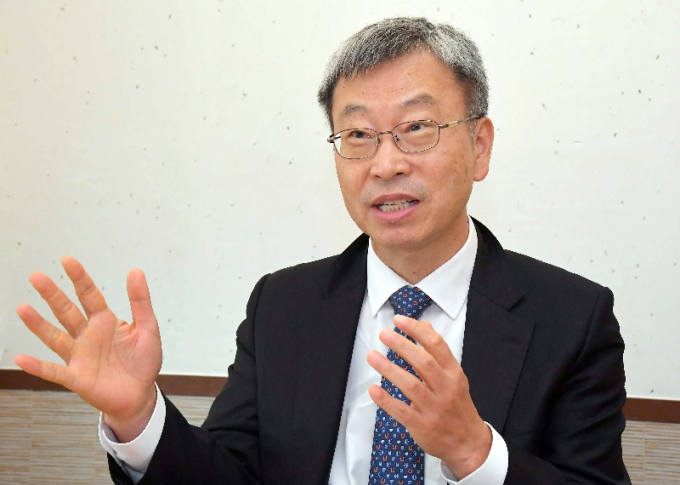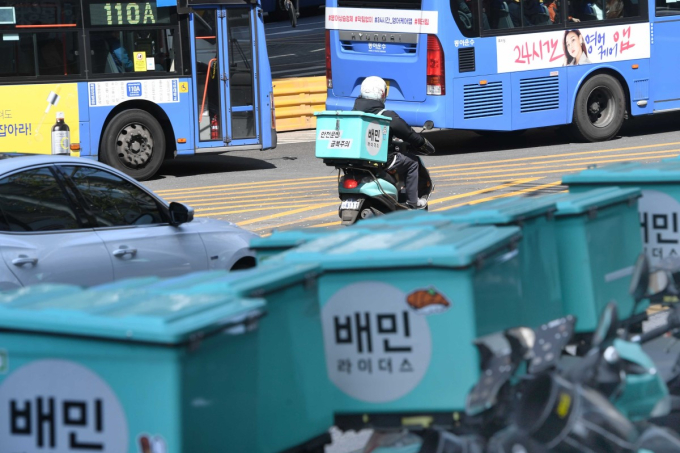Venture capital
KoreaŌĆÖs venture capital firms poised to grow, no bubble seen in market
By Dec 15, 2020 (Gmt+09:00)
6
Min read
Most Read

Growth in South KoreaŌĆÖs venture capital investments has been slow relative to the pace of the countryŌĆÖs economic growth, creating an opportunity for VC companies to further expand in the pandemic era, according to an industry association chief.
Chung Sung-in, chairman of the Korea Venture Capital Association (KVCA), also urged the government to redouble efforts to invigorate the nationŌĆÖs venture ecosystem, a key to sustainable growth of the Korean economy.
ŌĆ£KoreaŌĆÖs nominal GDP has grown threefold since 2000, whereas venture capital investments barely doubled in the same period. It is no time to worry about a bubble forming in the VC market,ŌĆØ Chung said in an exclusive interview with The Korea Economic Daily on Dec. 15.
ŌĆ£Back in the early 2000s, smaller IT firms such as Naver, Kakao and Celltrion came into being amid a bubble controversy. Those companies are now leading their respective industries. Talk of another bubble is swirling around the VC market. But if the market nurtures a second Naver, a second Kakao, then itŌĆÖs worth it.ŌĆØ
Chung, also chief executive of Premier Partners, a local private equity firm, said the venture industry is emerging as ŌĆ£the central axisŌĆØ of the local economy, replacing existing backbone industries.
ŌĆ£Digital transition is happening across all industries with the spread of the COVID-19 virus, which in turn accelerates growth in venture enterprises. No longer is national and corporate development possible without venture investment,ŌĆØ he said.
He also urged the government to work out VC revitalization measures such as capital gains and tax exemptions as well as a separate operation of the tech-heavy Kosdaq market.
Touching on the issue of a monopoly in platform operators, the KVCA chairman said it may be inevitable for some pioneering companies to have a short monopoly in the initial stages of business development.
ŌĆ£In the market economy, extreme monopolies are readily controlled with the emergence of strong new competitors. What is required of the government is to create systems for new competitors to easily join the race,ŌĆØ he said.
In late July, the government said it will revise laws to allow conglomerates to own venture capital units in the form of wholly owned subsidiaries. The Federation of Korean Industries said the government needs to keep related red tape to the minimum to facilitate active investment in startups.
According to the Ministry of SMEs and Startups, venture capital investments in Korea hit an all-time high of 1.2 trillion won ($1.1 billion) in the third quarter.
But investor sentiment was spooked last month when the Fair Trade Commission, citing concerns over a market monopoly, gave conditional approval for the proposed merger between Germany-based Delivery Hero SE and KoreaŌĆÖs Woowa Brothers Cop., which runs KoreaŌĆÖs largest food delivery app Baedal Minjok (Baemin).

In 2019, Tada, a van-hailing service launched by a local venture firm, faced strong opposition from taxi drivers, prompting the government to pass a law that suspended the popular service.
The following is an edited transcript of the interview:
Ō¢Č How do you assess this yearŌĆÖs venture investment market?
ŌĆ£The pandemic has hurt all industries, including VC investments. But the non-contact boom has created good business opportunities. Growth sectors such as 5G, AI, big data, Internet of Things, bio and healthcare have taken off with the pandemic.
In the local economy, the role of startups has been limited, or seen to be limited, to just create jobs and help tech development. There have been some unicorns (with an enterprise value of at least US$1 billion) like Coupang or Baemin. Nevertheless, there werenŌĆÖt great expectations for them to lead the economy. Things have changed, however. Starting this year, Coupang, Musinsa (fashion platform) and other unicorns are leading a change in the distribution industry. Venture firms such as Naver, Kakao and Celltrion are on top of the Kosdaq market in terms of market cap. They are new growth industry leaders.ŌĆØ
Ō¢Č There is talk of a bubble forming in the local VC investment market.
ŌĆ£When people talked about an IT bubble in the early 2000s, local VC investments totaled 2 trillion won a year. And then the bubble burst and the market was able to return to the level after 15 years. With government support amid a global venture boom in the past five years, the size of local VC investments has doubled to 4 trillion won. But in the past two decades, KoreaŌĆÖs nominal GDP grew threefold. Some sectors have valuation issues, maybe. But this is no time to worry too much about a bubble.
For innovation, I would say we need a bubble to a certain extent. During the IT bubble, the country saw, for the first time in 50 years, young talent move out of big businesses to launch venture startups. And now, talented youths are starting businesses again. If they are complacent with what they are given, youŌĆÖll never see another Naver or another Kakao.ŌĆØ
Ō¢Č Some people say unlisted Korean startups are overvalued.
ŌĆ£With ample liquidity in the market, inflated enterprise valuations are not uncommon. But itŌĆÖs the investors that have to face the result of their wrong valuations in the end. Some people ask if Korea needs unicorns with an enterprise value of more than 1 trillion won. Look at Baemin. It sold with a price tag of close to 5 trillion won. If you have a good business model, you will be recognized in the global market. Gaming unicorns such as Krafton and Bluehole are already making hundreds of billions of won a year. Their value will rise further as theyŌĆÖre playing on the global stage. Look at DoorDash, the American food delivery service. Its market cap has risen to nearly 60 trillion won after going public. We also need to nurture Korean firms as global unicorns.ŌĆØ
Ō¢Č What is needed for Korea to see more unicorns?
ŌĆ£First of all, venture funds expanding. VC investments have focused on the scale-up of venture firms. Five years ago, there were just a few venture funds with more than 100 billion won. But now they are countless. Some even boast 200 billion won or 300 billion won. The biggies will change the landscape of the local VC market. They will help us see more local unicorns.ŌĆØ
Ō¢Č Monopoly concerns, conflicts between venture firms and existing industry players, are increasing.
ŌĆ£As a venture capitalist, I believe any industry created through innovation will inevitably see the emergence of a monopoly. ThatŌĆÖs why we need to look at the monopoly of platform operators from a different perspective. Take a tea saucer, for instance. Suppose someone starts to sell round saucers in a market where everyone else is selling square saucers. Then he is a monopoly. But others soon follow him and make round plates, then itŌĆÖs a competition. A monopoly never lasts forever. What the government needs to do is to create systems to nurture new competitors. Blocking them from entering the market is the last thing to do.ŌĆØ
Ō¢Č WhatŌĆÖs your view on corporate venture capital (CVC) run by conglomerates?
ŌĆ£Small startups easily face a wall when they want to grow bigger, particularly in overseas markets. ThatŌĆÖs when they need the help of big companies. Local VCs lack the needed skills to go global. CVCs operated by the nationŌĆÖs conglomerates can help smaller local startups go global and enhance their values as well as making profitable exits from their investments.ŌĆØ
Write to Jung-hwan Hwang at jung@hankyung.com
In-Soo Nam edited this article.
More to Read
-
 FKI calls for further easing of new CVC rules to spur investment
FKI calls for further easing of new CVC rules to spur investmentAug 19, 2020 (Gmt+09:00)
2 Min read -
 Korean startupsVenture capital investments hit all-time high in S.Korea
Korean startupsVenture capital investments hit all-time high in S.KoreaDec 06, 2020 (Gmt+09:00)
2 Min read -
 NPS boosts private debt and venture capital investment in Q1
NPS boosts private debt and venture capital investment in Q1Jun 03, 2020 (Gmt+09:00)
1 Min read -
 Korean military fund to commit $30 mn to two US venture capital FoFs
Korean military fund to commit $30 mn to two US venture capital FoFsJun 02, 2017 (Gmt+09:00)
2 Min read -
![[Interview] Korea scientistsŌĆÖ fund zooms in on Europe renewable energy, U.S. venture capital](/data/ked/image/2016/06/ņĀĢļæÉņśü-ņżäņØĖĻ▓ā1.145x94.0.png) [Interview] Korea scientistsŌĆÖ fund zooms in on Europe renewable energy, U.S. venture capital
[Interview] Korea scientistsŌĆÖ fund zooms in on Europe renewable energy, U.S. venture capitalJun 15, 2016 (Gmt+09:00)
long read
Comment 0
LOG IN




